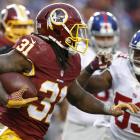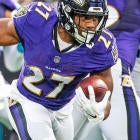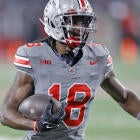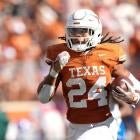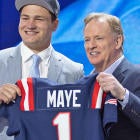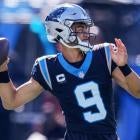The zero-RB strategy has gained popularity in Fantasy Football circles for one reason: no position is more prone to unpredictability than running back.
Injuries are a huge risk for players who spend their days hurtling full speed into a pile of massive men, but they aren't the only risk when it comes to the position.
Just as big a concern as injuries at the position is the inherent randomness of the position itself. Perhaps no position in any sport is more fungible than running back. Late-round picks turn into stars constantly, while first-rounders and established stars can fall off the cliff without much warning.
A big part of this is due to just how much running backs rely on the offense around them to create success. If there are no running lanes, it doesn't much matter how talented you are, while even the least coordinated back can run through some of the holes an offensive line like Dallas' can create.
Just last season, we saw first-round picks like Eddie Lacy, C.J. Anderson and Jeremy Hill bust for Fantasy owners, largely without injury concerns.
These players simply underperformed, and even in the cases where they didn't lose their jobs, they dramatically hindered their Fantasy owners' chances of competing for a title.
The running back position is incredibly tough to predict, even without injuries. Fantasy owners should be aware of the pitfalls, some of which might be staring us in the face.
Here are six running backs expected to open the season at the top of the depth chart who might end up losing their jobs faster than anyone would like.
David Johnson, Cardinals
A first-round pick? Am I joking?
Not necessarily.
Johnson was tremendous down the stretch last season, totaling 658 all-purpose yards over the final five games of the season, and showcasing solid skills in both the rushing and passing games. However, he fell off the pace a bit in the postseason, rushing for just 95 yards on 30 carries, and the Cardinals seem to like Chris Johnson quite a bit. If you're looking to avoid risk, David Johnson isn't the safest bet in the first round, and nothing can derail a season quicker than your first-rounder turning into a dud.
(As a sidenote, how annoying is it that both Cardinals' backs have the same last name?)
Backup plan: Chris Johnson
In fact, ESPN.com's Cardinals reporter Josh Weinfuss listed Chris Johnson as the team's starter in a recent early look at the depth chart. That would be a legitimate shock, but it makes some sense. David showed incredible flashes of big-play ability throughout the first three months of last season, but didn't have more than 10 touches from scrimmage in any game until Chris got hurt.
The Cardinals liked the reliability they were getting from Chris, who was well on his way to a 1,000-yard season before his injury. Both backs will figure into the job, but it wouldn't be a total shock if Chris got a larger share than we are currently expecting.
Devonta Freeman, Falcons
The Falcons didn't open the season with Freeman as the starter last year, a decision he made look pretty stupid for a six-week stretch. Freeman was the best running back in football for the first half of 2015, and that six-game stretch was incredible. He averaged 159 all-purpose yards while scoring nine total touchdowns, and looked like an absolute stud.
However, he looked a lot more like a running back who didn't deserve a starting role down the stretch, averaging just 3.1 yards per carry and 81.7 all-purpose yards over the final seven games of the season.
He still scored four touchdowns in the span, and a concussion suffered in Week 13 could explain some of his late struggles. But Freeman still averaged fewer than 4.0 yards per carry for the season overall and may have looked a lot better for Fantasy players than the Falcons' coaching staff.
Backup plan: Tevin Coleman
Coleman beat Freeman out for the starting job as a rookie before the 2015 season started, and looked like he might have been the better rusher before a rib injury sidelined him in Week 2. He rushed for 110 yards on 18 carries in his lone start down the stretch in Week 14, and beat out Freeman in yards per carry by a half-yard, at 4.51 overall.
Coleman didn't show much in the passing game, the one place Freeman really overshadowed him, so even if he does push Freeman for the starting role, he won't be an every-down back. Still, the Falcons invested a third-round pick in him even after having Freeman on the roster, and he was the starter a year ago. Don't be shocked if it happens again.
C.J. Anderson, Broncos
Anderson is almost certainly the starter in Denver coming into the 2016 season, but that was supposed to be the case last season, and he lost his role to Ronnie Hillman. The duo largely split work throughout the season, but Anderson did get 2.8 fewer carries per game than Hillman, while dealing with a variety of injuries.
It hardly seems worthwhile to put Anderson in as the starter here given the timeshare last season, however the Broncos did match an offer sheet worth $18 million in the offseason, so they clearly value him.
The good news is, Anderson closed out the season strong, rushing for 571 yards in the final eight games of the season, including the playoffs, while scoring six touchdowns. Stretch that out over a full season, and you've got a mighty-fine No. 2 back.
Backup plan: Ronnie Hillman, Devontae Booker
Hillman actually started 11 games for the Broncos last season, and has already established that he can be a useful option for both the Broncos and Fantasy players. They also brought the soon-to-be 25-year-old back as a free agent, so their confidence in Anderson may not be as obvious as the four-year deal he received might indicate.
Anderson may start the season out as the starter, but we've already seen that Hillman is willing and able to take his job if he gets the opportunity.
And if both Hillman and Anderson falter, fourth-round rookie Booker certainly could step up. He showed an all-around game at Utah, totaling 1,261 yards on the ground and 316 in the passing game in 10 games last season. He should be considered a dark horse late in your drafts -- especially with the recent trend in Denver of the starting running back on day one ending up losing the job before long.
Justin Forsett, Ravens
Reality caught up with Forsett, 2014's breakout star at running back.
Coming off a strong season at age 29, Forsett fell back to Earth hard in 2015, as his rushing average dropped from 5.4 to 4.2, and missed six games with a broken arm. He has never been much of a contributor in the passing game (4.9 yards per catch last season), and the addition of rookie Kenneth Dixon gives the team a nice option catching balls out of the backfield, so Forsett is going to need to re-establish himself as a strong runner. As a running back who turns 31 early in the season, it might too tall an order.
Backup plan: Javorius Allen/Kenneth Dixon
Allen showed a nice, well-rounded game upon taking over for Forsett last season, totaling 627 total yards in the final seven games of the season, with much of his work done in the passing game. Of course, the addition of Dixon could push him out of third-down work as well, which makes it imperative that Allen outperform Forsett in the rushing game to take advantage of this potential opportunity. The bad news is, he averaged just 3.5 yards per carry from Week 11 on.
Matt Jones, Redskins
Jones had some big plays as a rookie, especially in the passing game, where he averaged 16 yards per reception. However, he rushed the ball 144 times and finished with just 490 yards (3.4 yards per carry) and three touchdowns.
Oh, and he fumbled the ball five times, putting some pretty glaring red flags on his record.
Jones was a third-round pick last season, a pretty heavy investment in a running back at this point in the NFL, so Washington may reasonably expect more from Jones than he showed in the rushing game last season.
On the other hand, Jones' 4.8 yards per carry as a part-time player in college is hardly inspiring either. And his 3.4 yards per carry ranks 14th among 18 rookie running backs over the last decade, with a minimum of 140 attempts, and the group around him isn't super promising either. Le'Veon Bell is the only star running back to emerge from the group that averaged below 3.60. The likes of Daniel Thomas, Trent Richardson and Andre Williams are more representative. There's a chance Jones can overcome his difficulties as a rookie, but the chances aren't great.
Backup plan: Chris Thompson/Keith Marshall
We know Thompson is going to cut into Jones' playing time as a third-down back, but he had just 35 carries last season, so it might be a longshot to expect him to get much work on rushing downs. Marshall, a seventh-round pick out of Georgia, may be the dark horse here. He ran a 4.31 40-yard dash at the combine, but has dealt with a hamstring injury in the offseason and isn't even a lock to make the roster. Jones just doesn't have much pressure for his job, unless an Alfred Morris-like sleeper emerges in training camp.
Jeremy Langford, Bears
Langford had a strange rookie season as a fourth-round pick season, filling in during the second half of the season for Matt Forte and eventually splitting time with the veteran.
He didn't impress in the rushing game, averaging just 3.6 yards per carry, but showed a lot of potential as a pass-catcher, hauling in 22 passes for 279 yards in his part-time role. However, his impressive numbers were mostly limited to two big passing games. Langford hauled in 10 passes for 179 yards in Weeks 8 and 9, but had just 69 yards on 10 receptions over the final seven games of the season.
The Bears let Matt Forte walk in the offseason, so Langford should have the inside track to the starting job this season. However, it is an open question if his lackluster rookie season dooms him to a lifetime of mediocre production. Given the lack of production and pedigree, Langford is an obvious candidate to get pushed for playing time if he gets off to a bad start.
Backup plan: Jordan Howard
If the Bears aren't invested in Langford, it might not take much for them to turn the reigns over to Howard. Howard didn't require a huge investment on Draft Day, as just a fifth-round pick, but he impressed in his junior year at Indiana.
After making the jump from Conference USA to the Big 10, Howard was one of the more effective rushers in the conference, totaling 1,213 yards in just nine games, while upping his yards per carry from 5.2 to 6.2 despite the tougher competition.
However, Howard caught just 24 passes in college, so he might not be ready to play passing downs, which could lead to the dreaded timeshare.

























